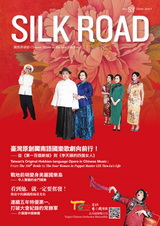Silk Road Bimonthly 053

Growing Up to Bear Fruits, While Growing Down to Take Roots!
Speaking of the development of Chinese music in mainland China, Taiwan and Hong Kong, Taiwan makes great contribution to both of its refining and popularization. On the one hand, the repertoire of Chinese music is enriched and diversified by the commissioned works, and on the other hand, new generations of youth enthusiasts of Chinese music are cultivated through the successful education in schools as well as in local clubs and associations.
The Four Women in Puppet Master LEE Tien-Lu’s Life, an opera piece produced by the Taipei Chinese Orchestra (TCO) in June, bears testimony to Chinese music’s refining in Taiwan. Producing such an original Hokkien-language opera is never an easy task. After all, it has been 27 years since the TCO produced its last opera piece! The first-ever Hokkienlanguage opera, Mackay ─ The Black Bearded Bible Man, was produced by the National Theater and Concert Hall (NTCH) in 2008. However, it is the TCO who first tries to blend Chinese music and Hokkien language in one work. Librettist LAI Mei-Chen spares no efforts in contemplating Hokkien language’s phonology and rhythms, while composer CHIEN Nan-Chang takes Chinese music’s characteristics into consideration in the configuration of musical instruments.
In terms of promoting Popularization of Chinese music, in addition to the prosperous development of Chinese music clubs at elementary and middle schools in Taiwan, the Chinese music education in Kinmen has also achieved outstanding results in the last decade under the leadership of conductor Huang Kuang-You. The successful model is even reproduced at Xiamen! Chen Chia-lin, one of the first youth musicians originating from Kinmen’s Chinese music clubs, was particularly invited to play erhu along with the TCO during its tour to Kinmen in April.
No matter refining or popularization, in the future, the TCO will continue to produce operas and musicals in alternate years for the TCO Theater so as to accumulate energies for cultivating theatrical talents and Chinese music works in Taiwan. Meanwhile, it will also make the most use of its resources to share and exchange with local clubs and associations to promote the growth of Chinese music enthusiasts and to provide solid support to the development of Chinese music!

![Taiwan.gov.tw [ open a new window]](/images/egov.png)
